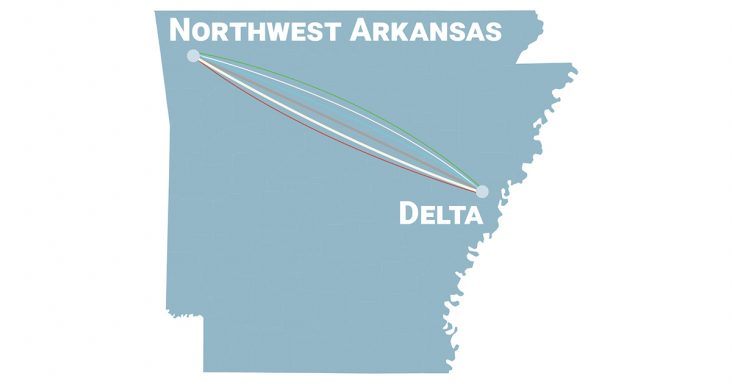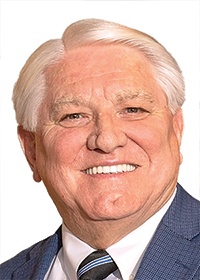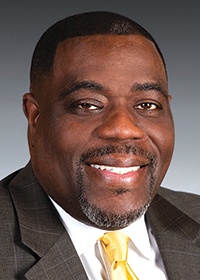Leaders wonder if Northwest Arkansas, Delta can collaborate in stronger fashion
by February 9, 2020 11:45 am 3,710 views

March 24, 1966. Then Arkansas Gov. Orval Faubus wrote a letter to Melvin and Charlotte Schexnayder, the leaders of the Dumas Clarion newspaper in southeast Arkansas. Charlotte would later serve as a state representative for the region.
Faubus was responding to an editorial the Schexnayders had written asking for his help in steering money to their area of the Delta for economic development. The governor, who was in the final year of his 12-year tenure, was sympathetic to the Schexnayders’ pleading for Delta help. Still, he claimed there were more desperate parts of Arkansas that needed the attention of the money he controlled.
“The mountain areas generally are much poorer than the Delta region. That is only natural because of the rich soil and fine crops in the Delta, whereas in the mountains, the land is so poor and rough that farming is very minor, compared to the Delta region. Also, six of the poorest counties in America are located in the Ozark Mountain region north of the Arkansas River. Frankly, there is more justification for the program in the mountain region, but there is also sufficient justification for such a program in the Delta region,” Faubus wrote.
This rejection letter was written 54 years ago — basically a generation ago — and serves as a stark reminder of how quickly economies can change and how dramatic those changes can be.
Could a governor come close to claiming in the year 2020 that Northwest Arkansas needed more economic assistance than the Delta of Eastern Arkansas? It would be a laughable suggestion.
The time has come, say several leaders, to find new paths to forge between different regions of the state. Steve Clark, president of the Fayetteville Chamber of Commerce and a former Arkansas Attorney General, and Davy Carter, regional vice president of Centennial Bank in Jonesboro and a former Speaker of the House, have ideas along those lines.

Clark’s idea originated from conversations with his longtime friend and former colleague Rodney Slater, a Marianna (Lee Co.) native who worked in Clark’s AG office. Slater, a D.C. lobbyist, is a former Arkansas Highway Commissioner and served as President Bill Clinton’s Secretary of Transportation.
“Rodney and I have been friends for more than 25 years, and we both come from the Delta,” Clark said. “When he’s in Fayetteville, which is often, we get to talking, and he says, ‘We need to find a way to mix these two regions of our state.’ And I couldn’t agree more.”
Clark, a native of Leachville (Mississippi Co.) and an Arkansas State University graduate, said he has wrestled to find a way to connect prosperous Northwest Arkansas to the struggling Delta. There are threads to make something happen, but the full fabric isn’t evident.
“Rodney and I started talking about ‘leadership’ and then ‘economic development’ — could there be incubation or innovation? How could we marry up people who have basically the same interest: They want to thrive. They need an opportunity to take their ideas and their ambition and their energy and find a way to thrive,” Clark said. “We have not hit on an answer yet, but we continue to look for ways to make that connection.”
Carter, a Marianna native, banker and attorney, still has parents living in his former hometown. He is saddened by the decline he’s seen in his lifetime and has spent years exploring possible ways to reinvest in his home county, which has the highest poverty level in the state at 43%. Benton County in Northwest Arkansas boasts the lowest poverty rate at 8.6%, and Washington County ranks 10th lowest at 15.2%, according to Census Bureau statistics released in December.
“I said this when we were debating Big River Steel. East Arkansas carried the water for the state for a long time. Now, it’s down on its back. I’m not talking about a handout. We need to find some ways to work together that can lift up everybody,” Carter said.
Carter, 45, has experimented with forming a group of alumni from his generation who might seed projects in Marianna or other parts of the Delta. Like Clark, the answers aren’t apparent.

“I don’t know all of the economics around some of these things,” Carter said. “If it was solely based on economics and it was the most cost-efficient way today to do it, somebody would already be doing it. I get that’s an issue.”
Rep. Reginald Murdock, a six-term Democratic legislator from Marianna, thinks a conversation to jump-start activity between the two regions of the state could lead to some early success.
“There has to be nothing but positive that can come from the conversation,” he said. “To talk to some of the instrumental people that were players or at least have relationships with those that were a part of the evolution of Northwest Arkansas from where it was to where it is … to bring those minds together to see how we can revitalize the Delta, and at the same time continue to enhance Northwest Arkansas, particularly Fayetteville, I think it’s a conversation that we really can have.”
All three men like the idea of a potential adaptation of the Sister Cities program that a handful of Arkansas cities have embraced as a cultural and political exchange with communities in other countries. For example, Fort Smith has a sister city relationship with Cisterna, Italy. Little Rock has multiple sister city relationships ranging from China to England to Brazil.
Could Fayetteville and Marianna test an Arkansas sister city model?

“In my opinion, that is an excellent concept. That represents a continuing relationship, so it’s not a one-off project. It can last decades,” Clark said. “And the more we’re together, the more we’ll find similarities and not differences.”
“I love that idea,” Carter said. “It’s about getting the right people in the room and talking about it. Those can lead to the kind of purpose-driven meetings to make things happen.”
Clark mentions that Fayetteville is working on a House of Songs project, where budding musicians can rent membership access to a studio facility, allowing them to play, collaborate, record or provide live music to audiences. Why not partner with a city in the Delta, vibrant with country and blues music?
Biking, one of Northwest Arkansas’ burgeoning cottage industries, is another option to partner. While Northwest Arkansas invests in trail after trail after trail, the Delta has a landscape that showcases an entirely different side of Arkansas.
“Could you imagine a network of trails biking from Crowley’s Ridge at the Missouri state line to the Mississippi River? That could be breathtaking,” Clark said.
“Outdoor recreation, quality of life, road bikes, off-road bikes — that’s what Marianna is rich with: water, good soil and nature,” Carter said. He thinks food, such as a farm-to-table or grain-to-glass initiative, could be a starter.
Murdock suggests that sports and entrepreneurship could lead to community exchanges and relationship building.
“We’re only as strong as our weakest link, and we know that Northwest Arkansas now is a very thriving part of Arkansas, and the Delta is what it is right now,” Murdock said. “I think collaboration is very, very intriguing, and I hope we can make it happen.”
“Just a little bit of hope goes a long way,” Carter said.
“I’m frustrated that we haven’t found an easy answer but not frustrated enough to give up,” Clark said. “All you have to do is light the match, and it will touch the wick and the flame will burn.”
